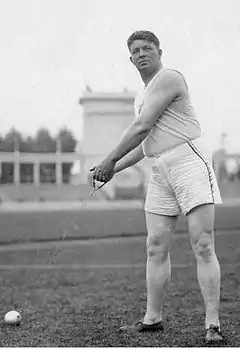Athletics at the 1920 Summer Olympics – Men's hammer throw
The men's hammer throw event was part of the track and field athletics programme at the 1920 Summer Olympics. The competition was held on Wednesday, August 18, 1920. 12 throwers from 5 nations competed; four from Sweden, four from the United States, two from Canada, one from Great Britain, and one from Finland.[1] No nation had more than 4 athletes, suggesting the limit had been reduced from the 12 maximum in force in 1908 and 1912. The event was won by Patrick Ryan of the United States, the nation's fifth consecutive victory in the event. Carl Johan Lind took silver, earning Sweden's first medal in the hammer throw. Another American, Basil Bennett, earned bronze.
| Men's hammer throw at the Games of the VII Olympiad | ||||||||||
|---|---|---|---|---|---|---|---|---|---|---|
 Patrick Ryan | ||||||||||
| Venue | Olympisch Stadion | |||||||||
| Date | August 18 | |||||||||
| Competitors | 12 from 5 nations | |||||||||
| Winning distance | 52.875 | |||||||||
| Medalists | ||||||||||
| ||||||||||
| Athletics at the 1920 Summer Olympics | |
|---|---|
| Track events | |
| 100 m | men |
| 200 m | men |
| 400 m | men |
| 800 m | men |
| 1500 m | men |
| 5000 m | men |
| 10,000 m | men |
| 110 m hurdles | men |
| 400 m hurdles | men |
| 3000 m steeplechase | men |
| 4×100 m relay | men |
| 4×400 m relay | men |
| 3000 m team race | men |
| 3 km walk | men |
| 10 km walk | men |
| Road events | |
| Marathon | men |
| Field events | |
| Long jump | men |
| Triple jump | men |
| High jump | men |
| Pole vault | men |
| Shot put | men |
| Discus throw | men |
| Hammer throw | men |
| Javelin throw | men |
| 56 lb weight throw | men |
| Combined events | |
| Pentathlon | men |
| Decathlon | men |
| Cross-country events | |
| Individual | men |
| Team | men |
Background
This was the fifth appearance of the event, which has been held at every Summer Olympics except 1896. Four of the 14 competitors from the pre-war 1912 Games returned: gold medalist Matt McGrath of the United States and three Swedes: fourth-place finisher Robert Olsson, fifth-place finisher Carl Johan Lind, and seventh-place finisher Nils Linde. McGrath, who would earn seven AAU championships from 1908 to 1926, and fellow American and world-record holder Patrick Ryan, who would win eight AAU championships in that time, were expected to dominate the event.[2]
Finland made its debut in the event. The United States appeared for the fifth time, the only nation to have competed at each appearance of the event to that point.
Competition format
The competition continued to use the divided-final format used since 1908, with results carrying over between "rounds". The number of finalists expanded from three in previous Games to six in 1920. Each athlete received three throws in the qualifying round. The top six men advanced to the final, where they received an additional three throws. The best result, qualifying or final, counted.[2][3]
Records
These were the standing world and Olympic records (in metres) prior to the 1920 Summer Olympics.
| World record | 57.77 | New York City, United States | 17 August 1913 | |
| Olympic record | 54.74 | Stockholm, Sweden | 14 July 1912 |
No new world or Olympic records were set during the competition.
Schedule
| Date | Time | Round |
|---|---|---|
| Wednesday, 18 August 1920 | 10:45 15:30 | Qualifying Final |
Results
The best six hammer throwers qualified for the final. McGrath injured his knee during the second throw in qualifying and withdrew, though still had thrown far enough to take fifth place.
| Rank | Athlete | Nation | Qualifying | Final | Distance |
|---|---|---|---|---|---|
| Patrick Ryan | 52.830 | 52.875 | 52.875 | ||
| Carl Johan Lind | 48.000 | 48.430 | 48.430 | ||
| Basil Bennett | 48.230 | 48.250 | 48.250 | ||
| 4 | Malcolm Svensson | 47.290 | Unknown | 47.290 | |
| 5 | Matt McGrath | 46.670 | — | 46.670 | |
| 6 | Tom Nicolson | —[4] | 45.700 | 45.700 | |
| 7 | Nils Linde | 44.885 | Unknown | 44.885 | |
| 8 | James McEachern | 44.700 | Did not advance | 44.700 | |
| 9 | Archie McDiarmid | 44.660 | Did not advance | 44.660 | |
| 10 | Robert Olsson | 44.190 | Did not advance | 44.190 | |
| 11 | Johan Pettersson | 41.760 | Did not advance | 41.760 | |
| — | John Cameron | NM | Did not advance | NM |
References
- "Athletics at the 1920 Antwerp Summer Games: Men's Hammer Throw". sports-reference.com. Archived from the original on 17 April 2020. Retrieved 20 January 2018.
- "Hammer Throw, Men". Olympedia. Retrieved 25 January 2021.
- Official Report, p. 116.
- Nicolson missed the qualifying round but was allowed to compete in the final after the other competitors petitioned for him to receive the opportunity.
Sources
- Belgium Olympic Committee (1957). Olympic Games Antwerp 1920: Official Report (in French).
- Wudarski, Pawel (1999). "Wyniki Igrzysk Olimpijskich" (in Polish). Retrieved 24 August 2007.